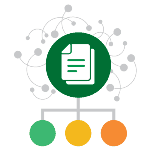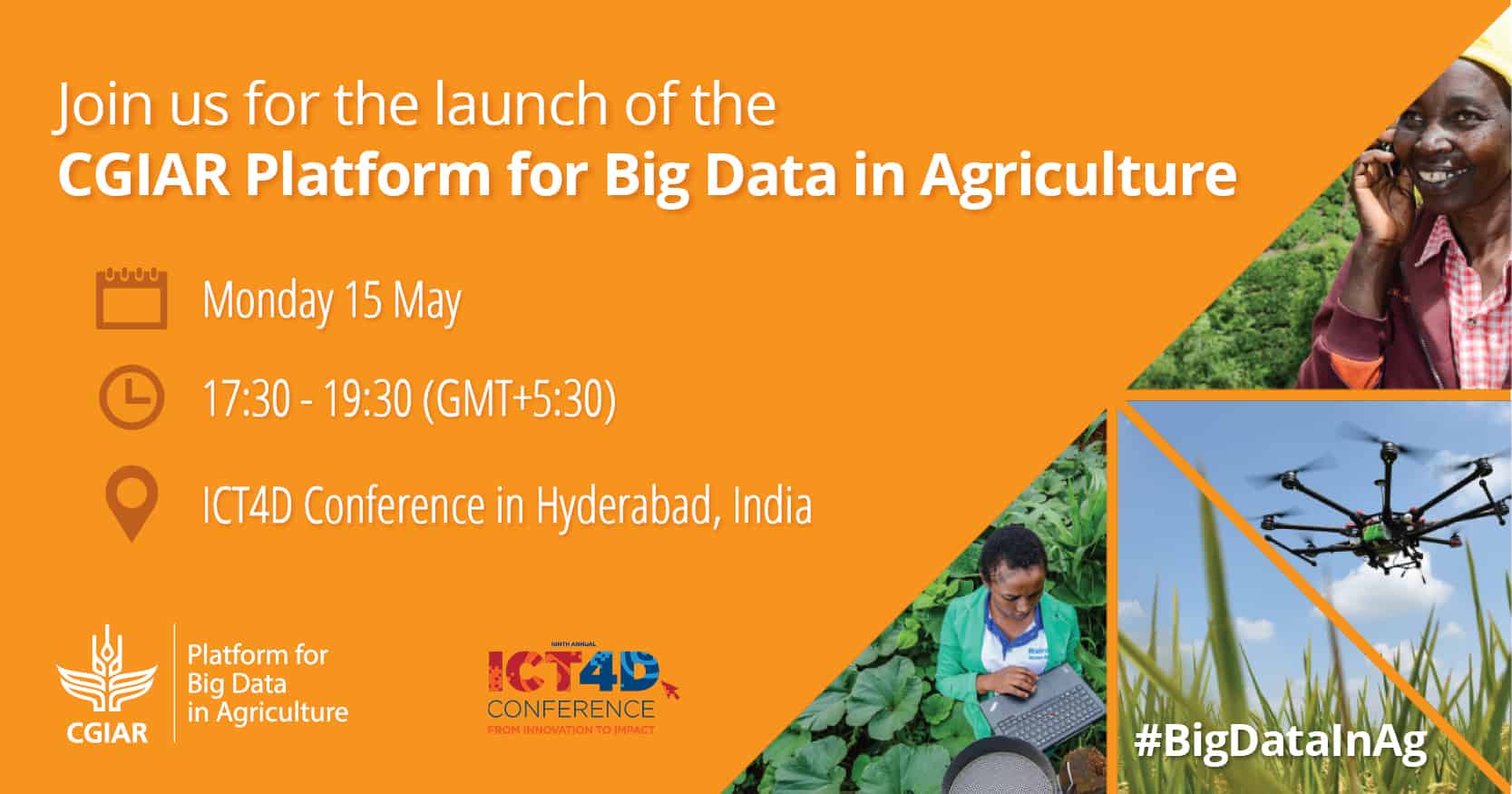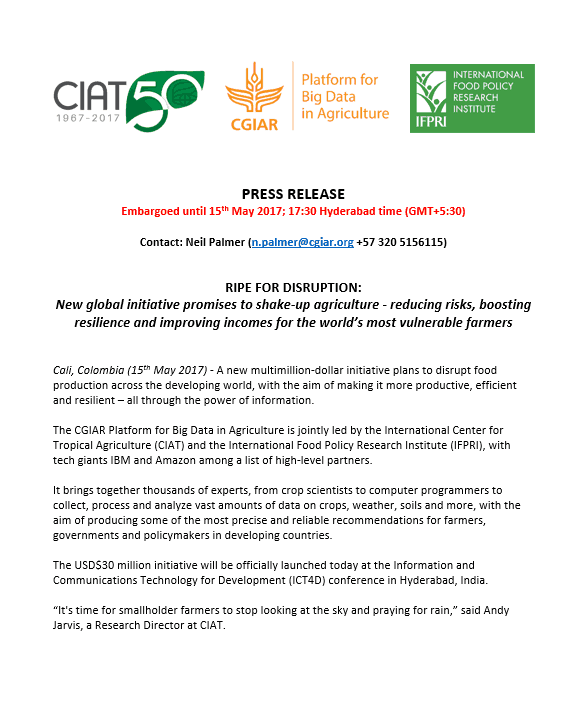New global initiative promises to shake-up agriculture – reducing risks, boosting resilience and improving incomes for the world’s most vulnerable farmers
Cali, Colombia (15th May 2017) – A new multimillion-dollar initiative plans to disrupt food production across the developing world, with the aim of making it more productive, efficient and resilient – all through the power of information.
The CGIAR Platform for Big Data in Agriculture is jointly led by the International Center for Tropical Agriculture (CIAT) and the International Food Policy Research Institute (IFPRI), with tech giants IBM and Amazon among a list of high-level partners.
It brings together thousands of experts, from crop scientists to computer programmers to collect, process and analyze vast amounts of data on crops, weather, soils and more, with the aim of producing some of the most precise and reliable recommendations for farmers, governments and policymakers in developing countries.
The USD$30 million initiative will be officially launched today at the Information and Communications Technology for Development (ICT4D) conference in Hyderabad, India.
“It’s time for smallholder farmers to stop looking at the sky and praying for rain. With enough data and enough analysts we’ll be able to say if the rains will be late or on-time. We’ll be able to say which crops to plant, when to plant and how much fertilizer or water to use. We’ll be able to anticipate shocks, reduce risks and maximize opportunities for profitable, sustainable agriculture.”
Early efforts by CIAT to apply so-called big data approaches to agriculture in Colombia have proven successful. In 2013 a team of analysts ran studies using decades of data from the country’s meteorological office and rice growers’ federation. The resulting recommendations on sowing times are estimated to have saved farmers in the country’s Córdoba Department around USD$3.6m in input costs in a single season. CIAT and its partners have also used big data approaches to track deforestation in the Amazon in near-real time.
“There’s no reason for precision farming to be the preserve of the fortunate few any more,” continued Jarvis. “While the data revolution has been a boon for farmers in richer countries, it needs to be democratized so that the world’s 500 million smallholders can benefit too – after all, they produce 70% of the world’s food.”
Other Platform partners in the include the Bill & Melinda Gates Foundation, the World Bank, the universities of Penn State and Michigan State, Kings College London, and PepsiCo, which has pioneered the use of big data to manage supply chains for consumer goods.

Organize

Convene

Inspire
The Platform will focus on three priority areas:
1. Organize – data on soils, climate, crops and more will be organized, standardized and made publicly available by the organizations that generate it. The Platform will begin by prioritizing the free and open sharing of data held by researchers at CGIAR – a global network of agricultural research organizations.
2. Convene – foster new partnerships between the agricultural science and technology sectors in order to bring together the best minds, and accelerate progress towards achieving the United Nations’ Sustainable Development Goals.
3. Inspire – put the data and partnerships into practice via a USD$4m fund to support innovative projects with big data approaches at their core, such as real-time monitoring of pest outbreaks, or site-specific recommendations for farmers on water and fertilizer use
“With enormous expertise and processing power now at our disposal, this is the next frontier in agricultural research-for-development, better use of data can help drive better policy decisions, helping solve development problems more quickly, cheaply, and at a greater scale than before.
“If we’re going to achieve the United Nations’ Sustainable Development Goals of increasing food production, reducing poverty and tackling climate change, one of the quickest ways will be to close the digital divide between rich and poor farmers. This will help ensure the world’s farmers and policymakers are making informed choices that produce the biggest impacts. The CGIAR Platform for Big Data in Agriculture aims to do exactly that.”
***
Additional information
The CGIAR Platform for Big Data in Agriculture aims to harness the capabilities of big data to accelerate and enhance the impact of international agricultural research. The six-year initiative will provide global leadership in organizing open data, convening partners to develop innovative solutions, and demonstrating the power of big data analytics through inspiring projects that focus on improving agriculture in developing countries, and informing policymakers. bigdata.cgiar.org.
The International Center for Tropical Agriculture (CIAT) is a scientific research organization committed to sustainable food production and improving rural livelihoods in Africa, Asia and Latin America. As well as developing new techniques and approaches to make agriculture more profitable, competitive and sustainable, for 50 years CIAT has been a trusted provider of impartial advice on agricultural and environmental issues to governments and policymakers all over the world. www.ciat.cgiar.org
The International Food Policy Research Institute (IFPRI) seeks sustainable solutions for ending hunger and poverty. IFPRI was established in 1975 to identify and analyze alternative national and international strategies and policies for meeting the food needs of the developing world, with particular emphasis on low-income countries and on the poorer groups in those countries. www.ifpri.org.
Both CIAT and IFPRI are part of CGIAR, a global agriculture research partnership for a food secure future. Its research is carried out by 15 centers in close collaboration with hundreds of partner organizations. www.cgiar.org

For media enquiries:
Neil Palmer
Senior Communicator
International Center for Tropical Agriculture (CIAT)
n.palmer@cgiar.org





